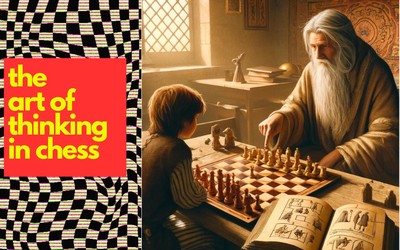
AI Generated Picture
Openings 101: Breaking down learning openings
Let's tackle one of the most important questions of the universe. How on earth do I learn openings?Introduction
Let's get real; I hear from at least one student daily who struggles with remembering opening moves and ends up making mistakes. I usually have a standard response, which I'll delve into more detail here.
Note: This advice primarily targets players below 1700 FIDE or around 2100 on Lichess. Beyond these ratings, getting your opening moves correct becomes crucial, but the essence of this advice still holds.
The Advice
-
Understanding Over Memorization: Yes, it sounds like a cliché, but it holds truth. While you're
undoubtedly intelligent, I'd bet you're not on the same level as a genius like Magnus Carlsen. Given our average human limitations, memorizing every single move and variation isn't realistic for most of us. Focusing on the key moves helps you understand why pieces move to certain squares, which makes remembering specific moves easier. For instance, in the Sicilian Defense, aiming for d5 is common, but there are a few cases where you won't do this. By getting the principles, you'll find it simpler to recall what to do in most situations, only needing to memorize the few exceptions; This does not mean you completely ignore all your opening moves, but it is crucial that you keep this mind when studying openings. You can forget moves, but you cannot forget the concepts/logics. As simple as that! -
Search for Annotated Games in your Variation: As both a coach and player, I regularly use ChessPublishing, a database where grandmasters annotate games, covering a wide array of lines. For lower-rated players, you don't need to worry about not having access to this database. You can simply search online, for example, "Caro-Kann Annotated Games," and you'll find plenty of good games to study, especially on a site like ChessGames. These days, you have the rather amazing Lichess Study, where you can see many popular studies by volunteers. Why not take a look at them? Youtube is also filled with collections of many games that have commentary. No excuses! Analyze the Grandmasters’ games; review the strategies and understand why they make certain moves, and learn from their wins and losses.
-
An opening gone wrong Isn't always fatal: Unless it's a severe blunder, a poor opening move isn't the end of the game. If you find yourself in a tricky position post-opening, stay calm and focus on what you can do to improve your position. Think of the opening as just laying down the groundwork for the middlegame that follows. It's like setting up the pieces of a puzzle that you'll solve as the game progresses; This holds true especially for the average joe, club players and below; If you're higher rated than that, you're looking at the wrong post!
-
Follow General Principles When Out of Book: We all forget our lines. Even Grandmasters do, that is not an excuse to start putting your pieces at random squares and going all in immediately. Instead, try to follow the basic principles, like focusing on castling, developing naturally. Sure, at times, castling might be not the best move, but probability is, that if you do not know what you're doing, you'd be much better castling!
-
Identify Experts in Your Preferred Opening: There are experts of particular openings, or players that have chosen a specific variation over a large course of their career. An example would be MVL, who has dedicated a lot of his life playing the Najdorf; That means, he's the right player for you to study; Go through his Najdorf games, and try and understand the "general" ideas/plans he goes for. You would not always get it, but there will still be some important lessons.
-
No Main-Line Opening is Bad: I've heard plenty of online posts deeming openings like the French or Caro-Kann as bad. That's a mistake. Unless an opening is completely discredited (which is rare, but possible, I'm looking at you, Cow Opening lovers), it's playable, especially at the lower levels. Remember, when someone says an opening is bad, that's just their opinion, not a fact. What doesn't work for one player might be the perfect fit for you. Heck, even Tyler1 crossed 1800 on Chess.com with just playing Cow. Why? He was familiar with the structures and positions after a whlie. He knew more about those positions than his opponent.
-
Expect Losses: Picture this: you're trying a new opening, winning every single game? That's unlikely right from the start. When you do face a loss, don't be disappointed. Take a step back, review your game to pinpoint where things went wrong, and analyze the reasons behind each slip-up. Just remember, if you're still finding yourself on the losing end after 30-40 games, it might be time to reassess your strategy and opening choice.
What opening should I choose? Main variation or a sideline?
Every player brings their unique style to the chessboard, especially when it comes to openings. Some players love mixing things up with multiple side variations, keeping their opponents guessing and making it hard for them to prepare. Then there are those who dive deep into one main opening variation, knowing it inside out, making their opponents anxious.
Personally, I lean towards the first approach. In my early chess days, many advised me to stick with the main lines like the Najdorf. However, exploring a variety of side variations suited me better, illustrating that there's no one-size-fits-all in chess. It's only now, as I'm on the cusp of securing my International Master norms, that I've delved into the main lines more deeply. At this level, opponents are adept at exploiting even the slightest deviations from the strongest lines. Until reaching a rating of 2200, I enjoyed experimenting with openings like the Benko and Grand Prix. Both strategies have their merits. Essentially, whatever type of player you identify with, It's important to figure out which approach clicks with you as you progress.
Who do I think are the role models for the philosophy I shared?
Now, a shoutout to Eric Rosen and his engaging videos on the London system. It's not just about the moves he shows; it's how he explains the ideas behind them, making chess more about smart thinking than just memorizing steps.
And don't forget about the Getting Started series by Everyman which is a great set of books for beginners and intermediate players. They explain very well the concept of different openings and you may try to apply one of those.
So, at the end, remember, that it's all about learning and having fun. Stay curious and enjoy the process!
About the Author:
I'm Adarsh, a FIDE Master, chess enthusiast, active professional and a chess coach at Magnus Carlsen's official chess academy. I have authored a Chessable Course, called World Class Ding Liren which takes you through the journey of Ding Liren, from a young-talented kid to being the World Champion!
- Checkout my chessable course: https://www.chessable.com/world-class-ding-liren-/course/164045/
- Interested in learning chess from me? Find more information at https://lichess.org/coach/adarshwick
More blog posts by adarshwick

The art of solving puzzles, and calculating: A guide on how to train properly.
Training calculation isn't just about going "takes takes takes takes and then there there there ther…